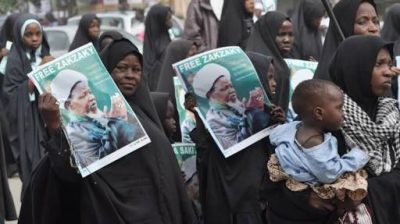El-Zakzaky: IMN members using terror, violence to subvert justice – Report
The centre said IMN members were using terror and violence to subvert justice in ongoing trial of El- Zakzakky.
CESJET made this disclosure in a special report on the activities of the Islamic Movement in Nigeria that culminated in the inauguration of a Judicial Commission of Inquiry as well as the ongoing court proceedings involving its leader Ibrahim El-Zakzaky in Kaduna State.
Isaac Ikpa, Executive Director of the group, who signed the report, said that it was indeed discovered that the activities of the IMN in Nigeria had constituted a threat to the sovereignty of the country through its actions that in most cases are against the constituted authorities
The report below.
The Centre for Social Justice, Equity and Transparency (CESJET) commissioned a report to look into the activities of the Islamic Movement in Nigeria (IMN) that led to the arrest and charging to court of its spiritual leader, Ibrahim El-Zakzaky, as well as critically examining judicial decisions, actions of the Federal government and the reason why El-Zakzaky hasn’t been released.
CESJET having followed the chain of events closely from inception, commissioned the report in an attempt to leave the realm of speculation and present tangible facts in proper perspective as regards the ongoing trial of the spiritual leader of the IMN for members of the general public and other concerned stakeholders in Nigeria and elsewhere.
The IMN is a Shi’ite religious and political organization whose leader, Ibrahim El-Zakzaky, has been a proponent of Shi’a Islam in Nigeria since the 1980s, calling for an Islamic revolution to create an Islamic state in Nigeria and end Western influence in the country. The IMN says it gets inspiration from Islamic Iran in its struggles and activities, but denies being funded by Iran.
The IMN has had uneasy relations with the Nigerian authorities for decades, and its spiritual leader has been jailed several times by successive regimes, spending a total of nine years in prison since the mid-1980s, mostly accused of treason or civil disobedience. Successive Nigerian authorities have accused the IMN of disregarding the law and operating as a state within a state. Processions, demonstrations and other activities organized by the IMN, usually without obtaining the necessary permits and at times blocking public roads, have resulted in a confrontation with the Nigerian authorities and strained relations with other communities.
In 2015, the convoy of the Chief of Army Staff was ambushed by members of the IMN sect during a procession in Zaria. The visible threat to the life of the Chief of Army Staff resulted in exchanges by the Nigerian Army and members of the sect, which eventually led to the arrest of its spiritual leader.
A Commission of Enquiry was set up by the Kaduna State Government to look at the issues surrounding the clash between the Nigerian Army and the IMN, and consequently, the Kaduna government, relying on the findings of the Commission of Inquiry declared the IMN an Insurgent group. The government’s position was contained in a white paper released on the report of the Judicial Commission of Inquiry into the December 2015 clash, between soldiers and members of the IMN in Zaria.
The white paper blamed the IMN for the clash and recommended the investigation and prosecution of any of its members found to have been involved in any form of human rights abuse since their existence in Zaria over 30 years ago. The government’s white paper, however, absolved the Nigerian army from any act of human right violation in the Zaria clash, insisting that the army abides by the rules of engagement.
In a similar vein, the Kaduna State chapter of the Supreme Council for Sharia in Nigeria (SCSN) called on the Federal Government to ban all activities of the Islamic Movement in Nigeria and prosecute their leader, Sheikh Ibrahim El-Zakzaky.
Rising from their meeting in Kaduna, the group comprising of Islamic preachers and scholars, supported the indictment of the Shiites by the Judicial Commission of Inquiry set up by the Kaduna State government to investigate the December 2015 clash between the Shiites and soldiers in Zaria.
The Muslim leaders maintained that the acts of impunity exhibited by the group over the years in Zaria and other states in Nigeria’s northern region were against the teachings of Islam and the Nigerian Constitution. They re-emphasised the urgent need to proscribe the Shiites for the interest of peace and security of Nigeria.
Upon scrutiny of the report by CESJET, it was indeed discovered that the activities of the IMN in Nigeria had constituted a threat to the sovereignty of the country through its actions that in most cases are against the constituted authorities. The Judicial Commission of Inquiry highlighted this much set up by the Kaduna State government to unravel the remote cause of the clash between the Nigerian Army and the IMN.
The outcome of our report also indicated that right from inception the IMN has the practice of radicalizing its members which have resulted in frequent clashes with constituted authorities in Zaria, its environs and many states across the country. (Vanguard)


